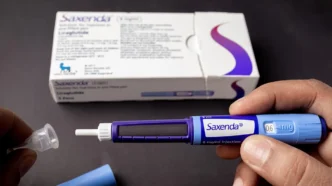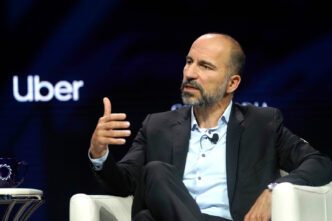After losing access to compounded versions of blockbuster GLP-1 drugs like Ozempic and Zepbound, online weight-loss clinics are pivoting to an older and less effective alternative: liraglutide. Originally sold by Novo Nordisk under the brand names Victoza and Saxenda, the drug has been available in generic form since 2023—and it’s now fast becoming the go-to replacement for telehealth companies eager to stay in the GLP-1 game.
Liraglutide works similarly to newer GLP-1s by mimicking a hunger-regulating hormone and controlling insulin. But the similarities stop there. Unlike Ozempic or Zepbound, liraglutide is less effective, comes with a higher risk of side effects, and must be injected daily, making it a harder sell for long-term use.
Still, with compounded semaglutide and tirzepatide facing an FDA-mandated phase-out—semaglutide’s final cut-off is May 22—telehealth startups and compounders are scrambling for alternatives. Liraglutide, still on the FDA shortage list, is fair game for compounding and distribution, giving companies a temporary legal safe zone.
A Substitute, Not a Successor
Major players like Hims and over a dozen other telehealth platforms have already added generic or compounded liraglutide to their offerings. Some, like Ageless RX, are promoting it as an “easy transition” for users switching from more powerful GLP-1s. Large compounding pharmacies, including Olympia Pharmaceuticals, are preparing for a ramp-up, citing major contracts in the pipeline.
Olympia’s CFO, Joshua Fritzler, said the company will treat liraglutide similarly to how it handled semaglutide and tirzepatide—high-volume, turnkey production for online providers. But with lower efficacy and increased dosing complexity, doctors are urging caution.
Clinical trials have consistently shown that semaglutide and tirzepatide outperform liraglutide, delivering more weight loss and better side effect profiles. “It’s better than nothing,” says Dr. Justin Ryder, an obesity specialist at Northwestern University, “but expectations should be held in check.” He warns that patients seeking dramatic weight loss will likely find liraglutide underwhelming, especially considering the daily injection burden.
Price vs. Potency
Despite its drawbacks, liraglutide is appealing for one reason: availability. And to many users, its lower up-front price makes it an attractive option—at least at first glance. But obesity medicine expert Dr. Angela Fitch says those cost savings may be deceptive. Because liraglutide requires daily use, patients may end up spending more over time while achieving less weight loss. “It might actually be more affordable to take a more potent drug,” Fitch explains.
Adding to the confusion is the rise of custom compounded formulations, with some companies marketing their liraglutide blends as “non-identical” to patented drugs by tweaking doses or mixing in vitamins. While this may buy them some legal leeway, pharma giants like Eli Lilly are already taking action, suing providers for allegedly selling unauthorized drug copies.
Others are pulling back altogether. Olympia, for instance, has announced it’s ceasing semaglutide production in compliance with FDA timelines. Meanwhile, liraglutide—despite its inferiority—is emerging as the last remaining GLP-1 option for startups trying to stay in the business.
The shift to liraglutide highlights a broader dilemma: telehealth startups built on access to low-cost GLP-1 alternatives now face a future with fewer legal loopholes and less effective meds. And patients, lured by the convenience of online clinics, may not realize that the new offerings don’t stack up.
While liraglutide does have clinical value, especially for certain patients with type 2 diabetes, its limitations are significant. Daily injections, weaker results, and more intense side effects make it a harder long-term solution for weight loss. As the FDA tightens enforcement, both providers and patients will need to rethink what’s truly sustainable—and what’s simply a stopgap.













